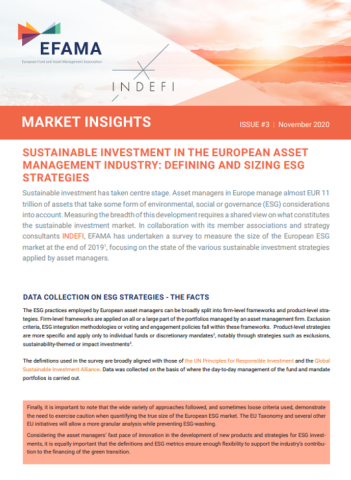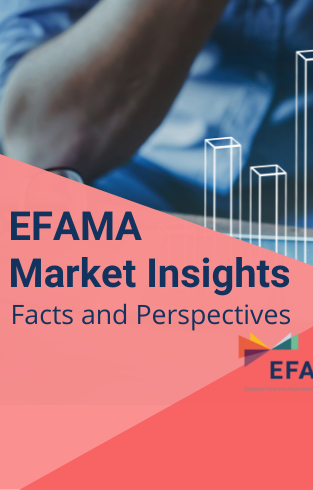The European Fund and Asset Management Association (EFAMA) has published its first ESG-focused Market Insights Sustainable investment in the European asset management industry: defining and sizing ESG strategies.
For this Market Insights, EFAMA collaborated with its member associations and strategy consultants at INDEFI to estimate the level and nature of ESG investment by European asset managers at the end of 2019, distinguishing between the ESG strategies applied at the firm level and those applied at the level of individual fund and discretionary mandate. The assets under management covered in the report include EUR 12.5 trillion of investment fund assets and EUR 11.4 trillion of mandate assets.*
Tanguy van de Werve, Director General of EFAMA, commented: "The research confirms that a wide variety of sustainable investment approaches are followed, demonstrating the need to exercise caution when quantifying the true size of the European ESG market. EFAMA and its members are committed to supporting the efforts undertaken to clarify which investments can be deemed sustainable, while ensuring enough flexibility to support the industry's contribution to the financing of the green transition through collaboration and innovation."
Richard Bruyre, Managing Partner at INDEFI, commented: "Echoing our findings on the institutional market, this analysis confirms that Europe has turned a corner in terms of sustainable investment. The breadth of practices and level of innovation witnessed in our industry demonstrates that asset managers are embracing a new competitive landscape in which sustainability will no longer bean option one can do without."
Highlights include:
- Firm-level ESG selection strategies represented a total of EUR 10.7 trillion or 45% of the total assets under management at the end of 2019 in the countries covered in the report. These strategies include two broad types of ESG selection: exclusions of certain types of investment and systematic and explicit integration of ESG risks and opportunities in the investment decision-making process.
- Exclusions are one of the most basic and common forms of ESG selection strategy nearly a third of assets covered in the report applied this strategy. ESG integration is the most popular ESG selection strategy, with a little over 37% of total AuM are selected following this approach.
- Investment stewardship and engagement also play a key role in the ESG strategies of many asset managers: EUR10.2 trillion of assets are subject to ongoing ESG-related engagement or voting policies, accounting for over 43% of total AuM.
- Product-level ESG selection strategies include four different approaches: exclusions, ESG integration, sustainability-themed products and impact investing. ESG integration is the most common selection strategy at the product-level in Europe. In total, EUR 3.9 trillion of assets are managed in this way, accounting for around 16% of total fund and mandate assets.
- Narrowing the data gap by ensuring reliable and comparable ESG data reporting by companies in Europe and beyond.
- Increasing transparency through appropriate disclosures by asset managers.
Avoiding the proliferation of national ecolabels by promoting the use of an EU label.
* This information is based on data covering the following countries: Belgium, Bulgaria, Denmark, France, Germany, Greece, Italy, Liechtenstein, the Netherlands, Norway, Poland, Portugal, Slovenia, Sweden, Switzerland, and the United Kingdom. The data has been provided by EFAMA member associations and asset management companies. The definitions used in the survey are broadly aligned with those of the UN Principles for Responsible Investment and the Global Sustainable Investment Alliance. Data was collected on the basis of where the day-to-day management of the fund and mandate portfolios is carried out.
-- ENDS
For media enquiries, please contact:
Hume Brophy
Kerri Anne Rice kerrianne.rice@humebrophy.com
Paul Andrieu paul.andrieu@humebrophy.com
EFAMA
Daniela Haiduc Daniela.haiduc@efama.org
Notes to editors:
About the European Fund and Asset Management Association (EFAMA):
EFAMA, the voice of the European investment management industry, represents 28 Member Associations, 60 Corporate Members and 24 Associate Members. At end Q2 2020, total net assets of European investment funds reached EUR 17.1 trillion. These assets were managed by almost 34,200 UCITS (Undertakings for Collective Investments in Transferable Securities) and more than 29,100 AIFs (Alternative Investment Funds). More information is available at www.efama.org. Follow EFAMA on Twitter @EFAMANews or LinkedIn @EFAMA for latest updates.
About INDEFI:
INDEFI is a strategy advisory partnership for the investment management industry. Operating out of London, Paris and Zurich it focuses on helping the worlds leading asset managers in shaping their business development strategies and build sustainable competitive advantage. Its scope of expertise spans institutional and distribution markets, public and private assets, organic and non-organic growth strategies and ESG and sustainability investing. More information is available at www.indefi.com




























